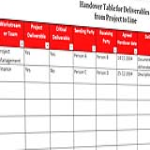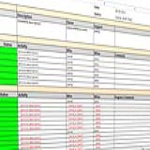Wekelijkse Buurtvergaderingsagenda

Opslaan, invullen, afdrukken, klaar!
De beste manier om een Wekelijkse Buurtvergaderingsagenda te maken? Check direct dit professionele Wekelijkse Buurtvergaderingsagenda template!
Beschikbare bestandsformaten:
.pdf- Gevalideerd door een professional
- 100% aanpasbaar
- Taal: English
- Digitale download (115.71 kB)
- Na betaling ontvangt u direct de download link
- We raden aan dit bestand op uw computer te downloaden.
Zakelijk Project management beheer werk wekelijkse personeelsvergadering wekelijkse personeelsvergadering
What are the steps in creating an agenda? In a meeting, what is the agenda and what are the expectations? Download this meeting agenda now and use it to create an agenda for your meeting. Set clear expectations for the meeting and make sure everyone knows the purpose of the meeting.
A Weekly Neighborhood Meeting Agenda is a document outlining the topics and activities to be discussed during a regular gathering of residents or stakeholders in a neighborhood or community. These meetings serve as a platform for neighbors to come together, discuss important local matters, address concerns, and collaborate on community improvement initiatives.
The agenda and expectations of a meeting are essential components that help ensure that the meeting is organized, purposeful, and productive. Here's an overview of what the agenda and expectations of a meeting typically include:
Agenda:
- Meeting Title and Date: Start the agenda with the meeting's title and the date it will take place.
- Opening and Welcome:
- Call to order: The meeting officially begins.
- Welcome and introductions: Particularly important if there are new participants.
- Review of Previous Meeting Minutes:
- Review and approval of minutes from the last meeting.
- Action items update: Discuss the status of tasks assigned during the previous meeting.
- Agenda Overview:
- Briefly explain the structure of the meeting, including the topics to be covered and the expected duration.
- Main Meeting Topics:
- List the main topics or agenda items, each with a designated time slot.
- Discussion and Decision-Making:
- Provide time for in-depth discussions and decision-making related to each agenda item.
- Guest Speakers or Presentations (if applicable):
- Introduction of guest speakers or presentation topics.
- Presentation and Q&A session (if relevant).
- Action Items and Assignments:
- Clearly identify action items resulting from discussions.
- Assign responsibilities and deadlines for each action item.
- Future Meeting Planning:
- Discuss upcoming meeting dates, topics, and potential agenda items.
- Announcements and Reminders:
- Share any important announcements, reminders, or upcoming events relevant to the group or organization.
- Closing and Adjournment:
- Summarize key takeaways from the meeting.
- Express gratitude for attendees' participation.
- Officially adjourn the meeting.
- Follow-Up and Next Steps:
- Mention any follow-up actions, communications, or tasks that need to occur after the meeting.
Meeting expectations are the guidelines and behaviors that participants are expected to adhere to during the meeting. These expectations help ensure that the meeting runs smoothly and productively. Here are some common meeting expectations:
- Punctuality: Arrive on time and be ready for the meeting to start promptly.
- Participation: Actively engage in discussions, share opinions, and contribute constructively to the meeting's objectives.
- Respect: Treat all participants with respect and courtesy, even when there are disagreements.
- Listening: Practice active listening by paying attention to speakers and avoiding interruptions.
- Stay on Topic: Keep discussions focused on the agenda items and avoid going off on tangents.
- Timeliness: Stick to the allocated time for each agenda item to ensure that the meeting stays on schedule.
- Preparation: Come to the meeting prepared by reviewing relevant materials and agenda items in advance.
- Cell Phones and Devices: Minimize distractions by silencing or turning off cell phones and electronic devices unless they are needed for the meeting.
- Follow-Up: Commit to completing assigned action items and follow up on tasks as agreed upon during the meeting.
- Constructive Feedback: Provide feedback in a constructive and respectful manner.
- Confidentiality: Respect any confidentiality agreements or sensitive information shared during the meeting.
- Adherence to Meeting Guidelines: Adhere to any specific meeting guidelines or protocols established by the organization or group.
It's important to communicate these expectations to meeting participants before the meeting begins and to revisit them as needed to maintain a productive and respectful meeting environment. Additionally, the agenda and expectations should align with the overall purpose and goals of the meeting to ensure its success.
We provide a professional agenda template that you can use to set up your weekly meeting with the people in your office or neighborhood.
Download this Weekly Meeting Template is useful to professionalize your way of communication towards the people in your Neighborhood. It also will save you time, cost, and effort!
DISCLAIMER
Hoewel all content met de grootste zorg is gecreërd, kan niets op deze pagina direct worden aangenomen als juridisch advies, noch is er een advocaat-client relatie van toepassing.
Laat een antwoord achter. Als u nog vragen of opmerkingen hebt, kunt u deze hieronder plaatsen.


